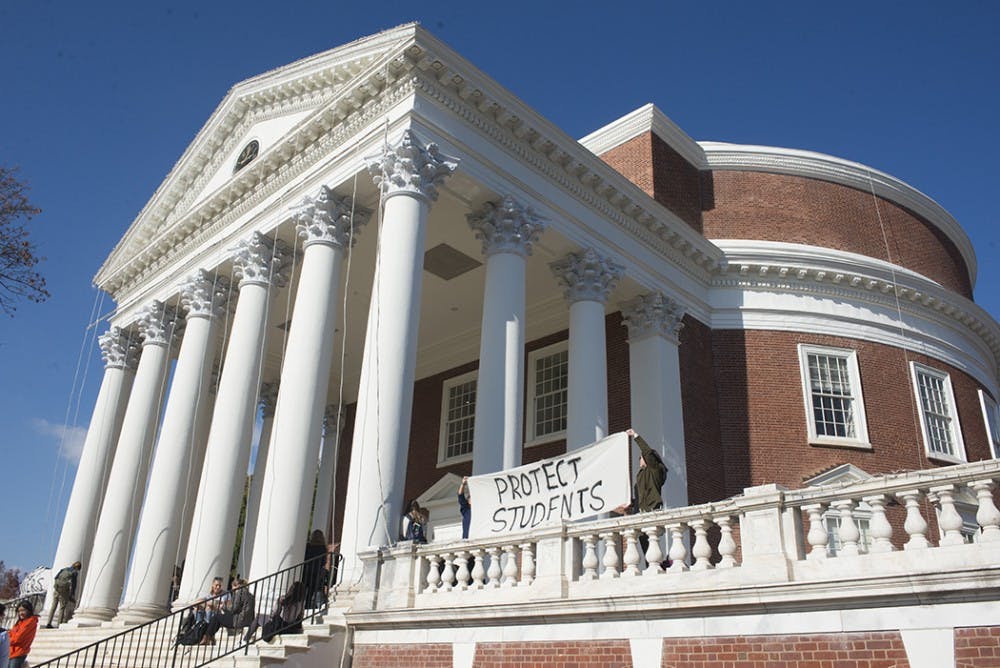The University’s Department of Spanish, Italian and Portuguese and DREAMers on Grounds hosted an information session on Deferred Action for Childhood Arrivals on Tuesday.
The event outlined how President-elect Donald Trump’s administration could affect DACA, including addressing misconceptions regarding the expectations for the incoming administration and the policy.
Charlottesville immigration attorney Edward Summers and Law Prof. David Martin spoke as panelists at the event.
DACA is an 2012 executive order signed by President Barack Obama that grants those who illegally arrived in the United States as children deferment on removal and the ability to obtain work permits.
Current estimates suggest 700,000-750,000 residents in the United States have DACA status, and Summers and Martin estimated as many as 30 University students fall within that category.
“DACA is not lawful status, [but] is an extension of something that has already existed — it created a structure for case by case decisions,” Summers said. “If you met the criteria, you qualified for DACA [and] essentially got permission to stay for limited amount of time and eligible for work authorization.”
Summers and Martin spoke about Trump’s assertions of revoking DACA, which he would be able to do since it remains an executive order.
“Trump’s options are freezing DACA and cutting off applications,” Summers said. “He could sunset DACA — or stop accepting renewals — or he could cancel DACA outright.”
Summers and Martin spoke to and fielded questions about the University’s role with DACA students, particularly regarding the concept of a “sanctuary campus” — a proposal mentioned in a recent letter sent by professors and DREAMers on Grounds to University President Teresa Sullivan.
A sanctuary campus, according to Martin and Summers, suggests students would have legal protection while on Grounds, which they said is misleading because the only locations immigration officers would need a warrant to enter are residence dorms.
“[A] sanctuary area is maybe more rhetoric but has no real world existence — it’s an expression of a sense of the community more than they are a legal or physical structure,” Summers said. “Calling a sanctuary [campus] could be counterproductive and inspire backlash from [the state legislature], that the University isn’t following the law.”
The University is limited in what it can do to protect DACA students from potentially being deported.
“Because U.Va. is a public institution, the University does not have the right to refuse entry to the Grounds to federal, state or local law enforcement,” University Spokesman Anthony de Bruyn said in an email statement. “The University has taken many steps as an institution to secure and protect all student information and would not release the identity of DACA students except to the extent required by law.”
Instead, Summers and Martin said the University should be taking steps to protect DACA students’ in-state tuition provided through an opinion from Attorney General Mark Herring in 2014 opinion and ensuring enrolled DACA students finish their education.
“The other thing that the University can do that would be directly beneficial would be to deal with the question of what to do about students who are actually enrolled who have deferred action and a way to have them actually graduate,” Summers said.
Asst. Spanish Prof. Allison Bigelow, a co-author of the faculty letter to Sullivan regarding DACA students, expressed her desire to have the University support its DACA students through graduation.
“What we can do is provide very public support for our DACA students,” Bigelow said.
Bigelow also said she was pleased by Sullivan’s response to the faculty letter and demands from DREAMers.
“We were really encouraged by her response, it was really timely and it was clear that she really cares about her students,” Bigelow said. “We are also encouraged that she expressed her commitment in allowing them to continue their education and to protecting their privacy [and] it would be nice for there to be a more public affirmation of that support, but it is nice to see that this is a community that welcomes diversity.”
Second-year College student Maddy Rabil said she learned a great deal from the panelists and also hopes the University will support DACA students.
“I had heard the term DACA thrown around but never really knew what it meant and I just think it's good that we have these dialogues at the University,” Rabil said. “Even though it’s unrealistic for the University to declare itself a sanctuary, it would be nice if they came out with an email saying they support DACA students and support them being able to continue their education.”
Sullivan has stated she supports all enrolled DACA students finishing their educations and is taking steps to show her support, de Bruyn said.
“President Sullivan recently signed a statement expressing support for DACA students,” de Bruyn said. “To date, more than 350 college and university presidents from public and private institutions across the United States have signed.”
The letter from Pomona College urges the continuation and expansion of DACA, calling it “a moral imperative and a national necessity.”
The presidents of Virginia Tech, Virginia Commonwealth University and William & Mary have also signed on to the letter.
Correction: This article previously misstated the name of the University’s Department of Spanish, Italian and Portuguese.







